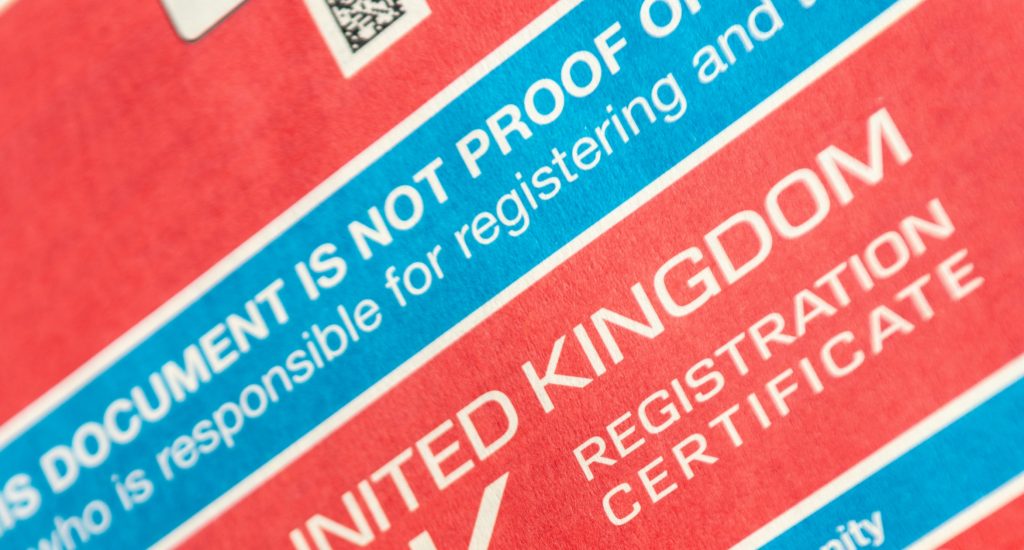Log Book Lowdown: Frequently Asked Questions
- A car logbook (aka V5, V5C) proves you are the registered owner of a vehicle.
- You need a logbook to tax, buy or sell a car.
- You should update your logbook if your personal details change, your car is modified or scrapped.
- If you lose your logbook, you can apply for a replacement from the DVLA.

An up-to-date logbook is a vital document for vehicle ownership. Also called a V5C registration certificate, you must take care of this documentation as it has many important roles to play, particularly when it comes time to buy, sell or modify your car.
In this article, we answer your frequently asked questions about car logbooks to ensure you stay on the right side of the law.
What is a vehicle logbook?
A logbook is sometimes known as a V5C registration certificate, or a V5 form, and is proof that you are a registered keeper of your vehicle. It is not proof, however, that you own a car. A log book is a highly important document that is mandatory and can impact the sale of your car in the future.
What do I need my logbook for?
The V5C logbook isn’t just a piece of paper to gather dust – it’s vital documentation. The DVLA refers to this document to track changes of personal details of the registered owner, along with information pertaining to whether the car has changed keepers, whether it’s been altered or modified, if it’s been scrapped, or if it’s been totalled. It’s also an essential document for occasions when you need to tax, buy or sell a vehicle.
When do I need to update my logbook?
You will need to update your V5C registration certificate if:
- The logbook does not arrive from the seller
- Your address or personal details change
- Your car is built or rebuilt
- Your car is modified in any way
- Your car is scrapped
- Your car is imported, or exported permanently
Get in touch with the DVLA to make updates to your document.
How do I apply for a logbook?
When you buy a car, it is the previous owner’s responsibility to register you as the owner and post the logbook to you. If the logbook does not arrive, you will need to apply for one. Simply get in touch with the DVLA to apply.
What information does a logbook contain?
You must keep your logbook updated with the most recent personal details – failure to do so may result in a fine. It will include information such as:
- The registered keepers
- Date of registration
- Any previous keepers
- Your address
- Details about the vehicle, including model, colour, engine details, colour, and tax
- Forms to send back if the vehicle is altered, scrapped or exported
What can I do about a lost car logbook?
We’re all human, and sometimes we misplace our logbooks. Other times they are stolen or damaged. In any case, you will need to reorder a replacement by phone or online as quickly as possible. The DVLA will issue you with a V62 form to apply for a new vehicle registration certificate (logbook), and you will need to send this off with a small fee to receive the new documentation.
Does a log book include service history?
No, a logbook does not include service history. Many garages keep records of a car or customer’s service history, but you will need to check with your chosen company how they file this.
Can you tax a car without a logbook?
No, you cannot tax a car without a logbook. The purpose of the logbook is to prove that you are a registered keeper of the vehicle, and without this proof, you are not allowed to apply to tax a car.
Can I buy or sell a car without a logbook?
Selling or buying without a logbook is a no-no. You should avoid buying a car without a logbook. When selling a car, buyers may equally wish to see an up-to-date V5 form before parting with their cash.
Sometimes, logbooks are lost due to carelessness or misplacement. Other times, a lack of logbook can signify that a “logbook loan” has taken place – whereby a car owner has got a loan on the value of their car, with the agreement that the lender keeps the logbook, while the car owner can still benefit from driving their car. However, if these loans have not been paid off, the lender will keep the logbook and the owner will effectively remain in debt. By buying a car with such history, you could be giving yourself a serious headache – sometimes leading to your newly-bought car being repossessed.
Also be wary of prints or duplicates of a logbook when buying a car, as this could hint that the original is tied up in a logbook loan. You may also wish to ask for proof that the seller is the owner of the car, rather than just a registered keeper.
Here at Mr Tyre, we are the go-to tyre specialists for Central England. We supply a wide range of premier tyre brands, and also provide professional vehicle servicing and MOT testing. With 35+ branches across the region, there’s always a garage nearby for customers to benefit from our high-quality products and services. Simply contact us today to discover more.

